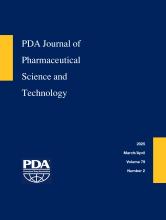Abstract
Among the factors that affect the glass surface chemical durability, pH and complexing agents presence in aqueous solution have the main role (1). Glass surface attack can be also related to the delamination issue with glass particles appearance in the pharmaceutical preparation. A few methods to check for glass containers delamination propensity and some control guidelines have been proposed (2,3). The present study emphasizes the possible synergy between a few complexing agents with pH on the borosilicate glass chemical durability. Hydrolytic attack was performed in small volume 23 ml type I glass containers autoclaved according to EP or USP for 1 hour at 121°C, in order to enhance the chemical attack due to time, temperature and the unfavourable surface/volume ratio. 0,048 M or 0.024 M (moles/liter) solutions of the acids citric, glutaric, acetic, EDTA (ethylenediaminetetraacetic acid) and sodium phosphate with water for comparison, were used for the trials. The pH was adjusted ± 0,05 units at fixed values 5,5-6,6-7-7,4-8-9 by LiOH diluted solution. Since silicon is the main glass network former, silicon release into the attack solutions was chosen as the main index of the glass surface attack and analysed by ICPAES. The work was completed by the analysis of the silicon release in the worst attack conditions, of moulded glass, soda lime type II and tubing borosilicate glass vials to compare different glass compositions and forming technologies. Surface analysis by SEM was finally performed to check for the surface status after the worst chemical attack condition by citric acid.
- Received November 3, 2015.
- Accepted June 13, 2016.
- Copyright © 2017, Parenteral Drug Association
PDA members receive access to all articles published in the current year and previous volume year. Institutional subscribers received access to all content. Log in below to receive access to this article if you are either of these.
If you are neither or you are a PDA member trying to access an article outside of your membership license, then you must purchase access to this article (below). If you do not have a username or password for JPST, you will be required to create an account prior to purchasing.
Full issue PDFs are for PDA members only.
Note to pda.org users
The PDA and PDA bookstore websites (www.pda.org and www.pda.org/bookstore) are separate websites from the PDA JPST website. When you first join PDA, your initial UserID and Password are sent to HighWirePress to create your PDA JPST account. Subsequent UserrID and Password changes required at the PDA websites will not pass on to PDA JPST and vice versa. If you forget your PDA JPST UserID and/or Password, you can request help to retrieve UserID and reset Password below.






